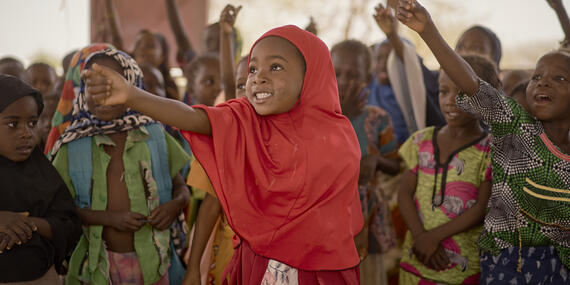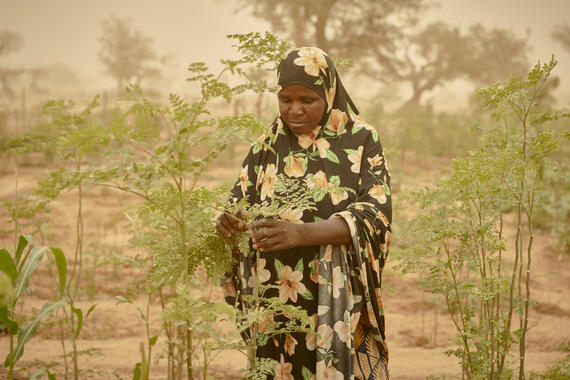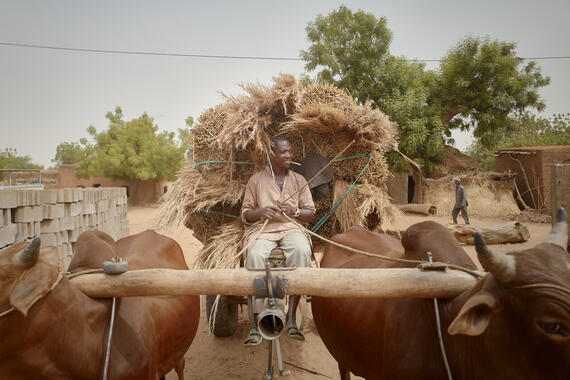Niger: Breaking the cycle of negative coping strategies

By Kate Katch
A pilot project in south-west Niger has shown that acting before people experienced a drought’s impact enabled them to preserve land, save livestock and avoid negative coping strategies.
Niger is now increasingly prone to droughts, with climate change causing its temperatures to rise 1.5 times faster than anywhere else in the world.
In early August 2022, data revealed south-west Niger had received the lowest rainfall in 30 years in June and July. This triggered the OCHA-facilitated anticipatory action framework to reduce the drought’s impact on 160,000 people. These frameworks use a model or forecast to trigger pre-arranged financing for pre-agreed activities to mitigate the impact of an imminent crisis. The OCHA-managed Central Emergency Response Fund (CERF) released US$9.5 million in August, months earlier than a traditional response.

The impact
More than 80 per cent of Niger’s population depend on agriculture, making communities particularly vulnerable to temperature rises and changing rainfall patterns. Niger is the most vulnerable country to climate change in terms of access to food production and fresh water supplies.
Given this dependence on agriculture, CERF funded cash-for-work programmes that employed more than 15,000 people, including women and youths, to create firebreak strips to secure grazing areas. As a result, animals had forage during the lean season, and people had cash to replenish their food stocks locally through village traders, further supporting the local economy.
A qualitative evaluation by Reos Partners and STRAT-CORE Plus found that cash-for-work programmes led to real change, with more than 80 per cent of beneficiaries surveyed finding this intervention highly relevant.
Parents received education grants that kept more than 10,000 children in school, and 1,300 girls who were about to complete their secondary-school exams received scholarships to ensure they could finish their education.
Tens of thousands of people avoided drought-related illnesses, as they had easier access to health care and water. More than 2,000 households benefited from rehabilitated drinking water supply systems, and a further 6,000 households could drink water at home due to the distribution of water treatment products.
Louise Aubin, the former UN Resident Coordinator/Humanitarian Coordinator for Niger, explained: “By giving 160,000 people in Niger the resources they needed ahead of time to preserve harvests, protect livestock, purchase food and access health care, they were not forced to migrate, to take children out of school, or significantly reduce food consumption. This not only led to less suffering but reduced the cost of more expensive interventions later.”

Takeaway
More investment in climate adaptation is essential to strengthen vulnerable communities' long-term resilience to cope with increasing floods and droughts. However, the pilot demonstrated that anticipatory action contributes by helping people avoid negative coping strategies ahead of climate shocks.
Communities wished the pilot project had reached larger numbers of people along with interventions that go beyond anticipatory action.
Niger is one of the four countries where the Flagship Initiative is being piloted. It aims to transform humanitarian assistance, ensuring it is driven by the priorities of the people OCHA serves and increases their self-sufficiency.
Lisa Doughten, Director of OCHA’s Financing and Partnerships Division, said: “The piloting of the Flagship Initiative in Niger, South Sudan, the Philippines and Colombia focuses on listening to communities, so the humanitarian community understands their priorities and how best to support them in planning ahead to respond to shocks. We are hearing that communities want to have the tools to strengthen their resilience to climate crises. Increased investment in anticipatory action, along with linking it to more development and climate action, will be key to responding to these priorities.”
The OCHA-facilitated collective anticipatory action framework for drought in Niger was updated in early 2024. An anticipatory action framework for floods is now being explored, as parts of Niger often experience severe flooding.
To learn more about anticipatory action in Niger, lessons learned and the pilot’s impact, read the full report. To learn more about OCHA’s anticipatory action pilots visit Anticipatory action and Data Science – The Centre for Humanitarian Data.
